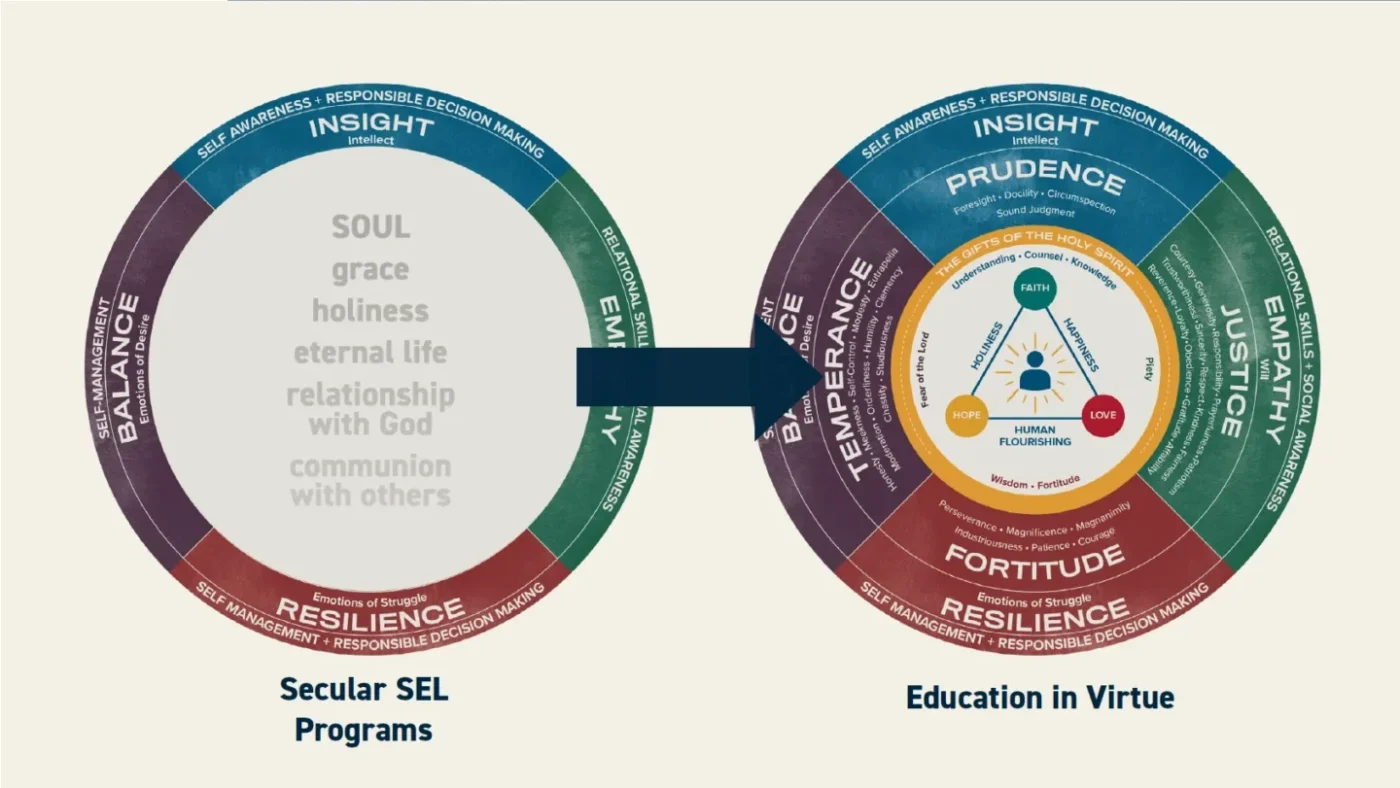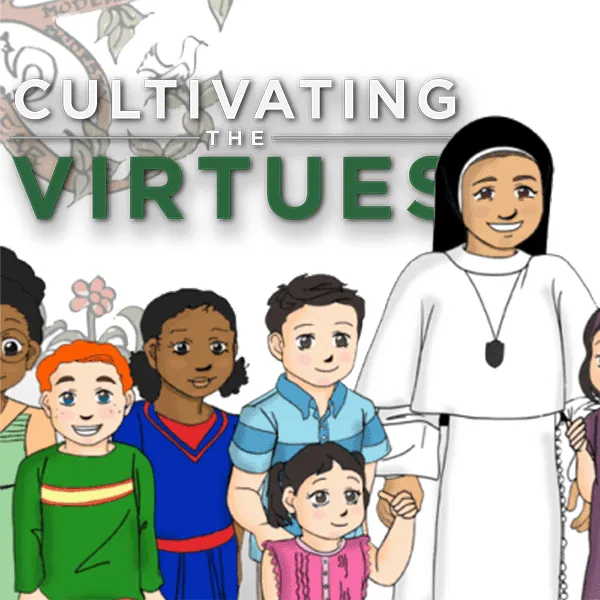SOCIAL-EMOTIONAL LEARNING (SEL)
& Education in Virtue
We are seeking to contain social-emotional learning within Christian anthropology and virtue education. As opposed to building skills and competencies through behavior modification, the approach of Catholic social-emotional learning seeks integration of the whole person with respect to their intellect, will and emotions (see CCC 1774).
Virtue Education is Catholic SEL
Why do I need Catholic SEL?
Secular programs can’t address the spiritual dimension of social emotional learning. WE CAN.
Disciple of Christ | Education in Virtue speaks to students as created in the image and likeness of God, body and soul. It provides authentically Catholic formation, giving students the tools they need to live an integrated social-emotional life in the light of grace
Our SEL tradition goes way back!
Targeted Resources
ADULTS
Formation for educators, parents, and caregivers who are entrusted with the essential role of nurturing children through their developmental years.
TEENS
Engaging video series and resources to draw adolescents into a healthy understanding of God’s infinite love, providing a firm faith foundation and strategies for growing up.
ELEMENTARY STUDENTS
In collaboration with Hallow, daily audio recording for elementary students that focuses on one virtue each week, accompanied by lesson resources for teachers containing strategies and more.
Catholic Approach:
Virtue Education is complete SEL.
Education in Virtue integrates key insights and strategies from the Applied Educational Neuroscience (such as neuroplasticity) and places them in dialogue with the Christian tradition. This groundbreaking synergy offers educators a wealth of practical insights into the formation of the whole person for wellness and holiness.
Disciple of Christ | Education in Virtue looks to Jesus as the perfectly virtuous man. Our resources complete formation by orienting students to Him as the model and source of their holiness and wholeness. The virtues are what it “looks like” and “sounds like” to be a disciple of Christ.

Formation provided through Education in Virtue
The following are just a few examples of resources natively included in EIV that are easily recognizable as SEL
Additional Resource: The Institute for the Transformation of Catholic Education provides a marvelous SEL professional development program called Insight. You can visit their website here.
Foundation
The following are excerpts from the book Raised in Grace, Made for Wholeness—the Beauty of Gradualness.
There is a paradigm shift going on of seismic proportions. We all know it and can see it unfolding before our very eyes. Today’s kids are in trouble. Tectonic shifts in our children and teenagers’ development are leaving them feeling unloved with low self-esteem, having little or no hope for their own futures, and prone to addictions and mental health struggles. Anxiety, depression, and suicidality have increased fourfold (Bethell, et. al., 2022). With the rise of smartphone and social media use beginning in 2010 and 2011 (Figure 1: Adapted from Substance Abuse and Mental Health Services Administration, 2020), we can observe how children have become more fragmented and fragile, displaying catastrophic struggles with identity formation and conflicts about growing up. Statistics reveal an exponential rise in mental illness in preteens and teens with approximately one in five children living with a major mental, emotional, or behavioral condition. Indeed, in a recent study, the prevalence of mental health problems in children ranged from 15 to 60% in a sampling of 132,000 children between the ages of 3 and 17 years old (Bethell, et. al., 2022). These same authors concluded that factors related to ACEs (i.e., adverse childhood experiences) and relational deprivations are largely responsible for this epidemic of dysfunction in today’s youth. Parents and teachers alike are unnerved by these trends and flabbergasted as to how to stop what essentially appears to be an inevitable catastrophe for all.
Our study Raised with Grace: Made for Wholeness proposes that in His mercy and goodness, God has provided an answer, a counter paradigm, and a road map, we might even call it “the way” (John 14:6) to guide those who care for and mentor His precious children, the most vulnerable among us. This providential road map is consistent with ancient wisdom and further bolstered through a Christian Anthropology supported by the insights of modern neuroscience. It reflects His design and our common humanity. His divine providence is being revealed in the shadow of unprecedented medicalization of childhood development, the breakdown of the family, and in how technology has begun to function as a pseudo-parent claiming the attention and internal workings of today’s young minds. Those with a heart still enough to listen understand how His plan is perfectly timed as well as specific, targeted and corrective, quieting a good deal of noise.
God’s answer to us began before the new millennia in the Decade of the Brain (1990-2000) when government funding was funneled into neuroscience research. Now major technological advances allowed researchers to look in on the working brain in real time. Out of this burgeoning neuroscience emerged the interdisciplinary fields of Interpersonal Neurobiology, Mind Brain Education and Applied Educational Neuroscience. As a result, we understand more clearly what contributes to healthy brain development, happiness and whole children growing into young adults who are equipped to pursue love and work.
While this interdisciplinary field reflects the complexity of the human person, there are several main findings which are central to understanding childhood development. Let us mention three of the most salient for our purposes. First, we now see clearly how brain neuroplasticity (i.e., brain neurons are being wired according to experiences) is greatest in childhood. Second, while the childhood brain is open to great learning and growth, it is also very sensitive to the effects of stress. Finally, during these formative years, the parent-child relationship and the teacher-student relationship is more central than any other experience to a child’s overall brain development and emotional adjustment. While on some level we have long appreciated these tenets of childhood development, they have been clouded and obscured by other practices and information. These scientific findings are God’s primary and divine grace to anyone raising children because they provide much needed focus and guidance for helping children to grow well in an overstimulating and fragmented information age which has carried new generations far afield from the moorings of creation and “intentional neuroplasticity.” Interpersonal neurobiology places the dignity of the human child and their relationships with loving caregivers at the center of the organically gradual and hallowed process of growing up.
Through interpersonal neuroscience, the Collaborative for Social–Emotional Learning (CASEL) recently identified five core competencies which are foundational to development including self-awareness, self-management, responsible decision making, relationship skills, and social awareness. We are consequently proposing that skill building and behavior modification are useful, but alone are not sufficient to address the mental health and emotional safety needs of today’s children.
Still needed is a robust commitment to the fact that the educational and formative processes must occur in the context of loving and secure relationships that are repeatedly lived out in the graces of daily life. Essential is a grace to trust a loving God in order that a child not feel alone in the futilities of growing up in today’s world. Essential is a grace that gives a child hope for a bright future filled with meaning and purpose. Grace is needed for a child and the adults around them to nurture love of God, self, and others to become just and kind disciples in their communities, vocations, and relationships. An early Medieval maxim tells us that “the Cross of Christ is still while the world turns” (the Carthusian motto: Stat Crux dum volvitur orbis). We are hoping to encourage parents and teachers, indeed anyone involved in mentoring children and teenagers, to use the neuroscience of co-regulation to become that “still point of grace” creating relational space in which young people can thrive and grow. We would further suggest that an understanding of interpersonal neurobiology, neuroplasticity, co-regulation, and of how stress lives in the brain and body are all critical in creating that “still point of grace” for a child and being an instrument of God’s divine plan. It is here that one’s life is centered on living from God’s love and grace as opposed to living dependent upon oneself.
pp. 7-11
Interpersonal neurobiology-informed approaches based on neuroscience are being prescribed in public schools through such programs as Social-Emotional Learning (SEL) and positive behavior support. The Collaborative for Academic and Social–Emotional Learning (CASEL), mentioned above, identified five core competencies which need to be taught to build academic success and maturation including: (1) self-awareness, (2) self-management, (3) responsible decision-making, (4) relationship skills, and (5) social awareness. While these recommendations are based on important neuroscientific findings, their implementation has not always been beneficent. This then raises the question: What is our mission in this context as Catholic educators and what differentiates our Catholic approach from mere behavior modification and skill building? We suggest that teaching virtue in the context of Christian anthropology, and the sacramental life, in particular, the grace of Baptism, (CCC 1262-1274) allows children to be raised in the sanctifying grace first infused in them in infancy and which must be continued throughout their childhood and into adolescence.
We are thus maintaining that the importance of intentional teaching of the theological (faith, hope, and love) and moral virtues (i.e., temperance, fortitude, prudence, and justice) responds to the need for Social–Emotional Learning in Catholic schools.
pp. 24-24
We also suggest that virtue education allows teachers and educators to address discipline in a positive and non-punitive manner thereby promoting empowerment, self-reflection and self-control. Talking and thinking about the lexicon of virtue aids students in building a reflective buffer between impulse and action (i.e., often driven by emotion) that allows for greater self-control and good decision making. Similar to Positive Behavior Support interventions, which provide a framework and a tiered system (e.g., school-wide, group, and individual interventions) for addressing the social, emotional, behavioral, and learning needs of all students, virtue education creates a safe and flexible school setting that improves academic and developmental outcomes. A shared vision of virtue in the context of a Catholic identity, drawing on the grace of a daily Christ-centered life, allows administrators, teachers, and students to clearly understand school-wide expectations, to practice responding to challenging situations with a common language, while also allowing for specific feedback on all three levels of Positive Behavior Support (PBS) intervention.
pp. 30-31
















